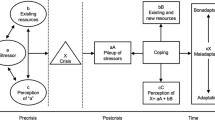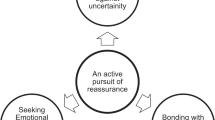Abstract
Objective:
The purpose of this study was to identify factors important to parents in their infant's end-of-life care.
Study Design:
Participants were parents (n=19 families) whose infant (less than 1 year old) had died. Parents completed the Revised Grief Experience Inventory (RGEI) and a semi-structured interview regarding their infant's end-of-life care. Interviews were rated using the Post-Death Adaptation Scale (PDAS).
Results:
Parents scored significantly lower than the normative sample on the RGEI, and PDAS scores suggested that these parents were adapting positively. Parent interviews identified the aspects of care that were important to parents: honesty, empowered decision-making, parental care, environment, faith/trust in nursing care, physicians bearing witness and support from other hospital care providers.
Conclusions:
Results of this study suggest that parents can effectively cope following the death of an infant and the medical staff can do much to improve the end-of-life care for infants and their families.
This is a preview of subscription content, access via your institution
Access options
Subscribe to this journal
Receive 12 print issues and online access
$259.00 per year
only $21.58 per issue
Buy this article
- Purchase on Springer Link
- Instant access to full article PDF
Prices may be subject to local taxes which are calculated during checkout
Similar content being viewed by others
References
Hoyert DL, Mathews TJ, Menacker F, Strobino DM, Guyer B . Annual summary of vital statistics: 2004. Pediatrics 2006; 117: 168–183.
Carter BS, Howenstein M, Gilmer MJ, Throop P, France D, Whitlock JA . Circumstances surrounding the deaths of hospitalized children: opportunities for pediatric palliative care. Pediatrics 2004; 114: 361–366.
Carter BS, Hubble C, Weise KL . Palliative medicine in neonatal and pediatric intensive care. Child Adolesc Psychiatric Clin N Am 2006; 15: 759–777.
Committee on Bioethics and Committee on Hospital Care. Palliative care for children. Pediatrics 2000; 106: 351–357.
Leuthner SR . Fetal palliative care. Clin Perinatol 2004; 31: 649–665.
Leuthner SR . Palliative care of the infant with lethal anomalies. Pediatr Clin N Am 2004; 51: 747–759.
Sumner LH, Kavanaugh K, Moro T . Extending palliative care into pregnancy and the immediate newborn period. J Perinat Neonat Nurs 20; 113–116.
Himelstein BP . Palliative care for infants, children, adolescents, and their families. J Palliat Med 2006; 9: 163–181.
Leuthner SR, Pierucci R . Experience with neonatal palliative care consultation at the Medical College of Wisconsin-Children's Hospital of Wisconsin. J Palliat Med 2001; 4: 39–47.
Pierucci RL, Kirby RS, Leuthner SR . End-of-life care for neonates and infants: the experience and effects of a palliative care consultation service. Pediatrics 2001; 108: 653–660.
Contro N, Larson J, Scofield S, Sourkes B, Cohen H . Family perspectives on the quality of pediatric palliative care. Arch Pediatr Adolesc Med 2002; 156: 14–19.
Heller KS, Solomon MZ . Continuity of care and caring: what matters to parents of children with life-threatening conditions. J Pediatr Nurs 2005; 20: 335–346.
Meyer EC, Ritholz MD, Burns JP, Truog RD . Improving the quality of end-of-life care in the pediatric intensive care unit: parents' priorities and recommendations. Pediatrics 2006; 117: 649–657.
McHaffie HE, Fowlie PW, Hume R, Laing I, Lloyd D, Lyon A . Crucial Decisions at the Beginning of Life: Parents' Experiences of Treatment Withdrawal from Infants. Radcliffe Medical Press: Oxford, 2001.
Lev E, Munro BH, McCorkle R . A shortened version of an instrument measuring bereavement. Int J Nurs Stud 1993; 30: 213–226.
Spinetta JJ, Swarner JA, Sheposh JP . Effective parental coping following the death of a child from cancer. J Pediatr Psychol 1981; 6: 251–263.
Richards L . Using N6 in Qualitative Research. QSR International Pty Ltd: Doncaster, Victoria, Australia, 2002.
Li J, Laursen TM, Precht DH, Olsen J, Moternsen PB . Hospitalization for mental illness among parents after the death of a child. N Engl J Med 2005; 352: 1190–1196.
Winjngaards-de Meij L, Stroeber M, Schut H, Stroebe W, van der Heijden P, Dijkstra I . Couples at risk following the death of their child: predictors of grief versus depression. J Consult Clin Psychol 2005; 74: 617–623.
Zjog HJ, Keller D . Mourning parents: considering safeguard and their relation to health. Death Stud 2002; 26: 545–565.
Rando T . An investigation of grief and adaptation in parents whose children have died from cancer. J Pediatr Psychol 1983; 8: 3–20.
Seecharan GA, Andresen EM, Norris K, Toce SS . Parents' assessment of quality of care and grief following a child's death. Arch Pediatr Adolesc Med 2004; 158: 515–520.
Meert KL, Thurston CS, Briller SH . The spiritual needs of parents at the time of their child's death in the pediatric intensive care unit and during bereavement: a qualitative study. Pediatr Crit Care Med 2005; 6: 420–427.
Davies R . New understandings of parental grief: literature review. J Adv Nurs 2004; 46: 506–513.
Author information
Authors and Affiliations
Corresponding author
Rights and permissions
About this article
Cite this article
Brosig, C., Pierucci, R., Kupst, M. et al. Infant end-of-life care: the parents' perspective. J Perinatol 27, 510–516 (2007). https://doi.org/10.1038/sj.jp.7211755
Received:
Revised:
Accepted:
Published:
Issue Date:
DOI: https://doi.org/10.1038/sj.jp.7211755
Keywords
This article is cited by
-
The importance of shared decision-making in the neonatal intensive care unit
Journal of Perinatology (2020)
-
Bereaved parents’ experiences of research participation
BMC Palliative Care (2018)
-
Introduction of triggers for palliative care consultation improves utilization and satisfaction within a level four NICU
Journal of Perinatology (2018)
-
What information do parents need when facing end-of-life decisions for their child? A meta-synthesis of parental feedback
BMC Palliative Care (2015)
-
Initial development and psychometric testing of an instrument to measure the quality of children’s end-of-life care
BMC Palliative Care (2015)



